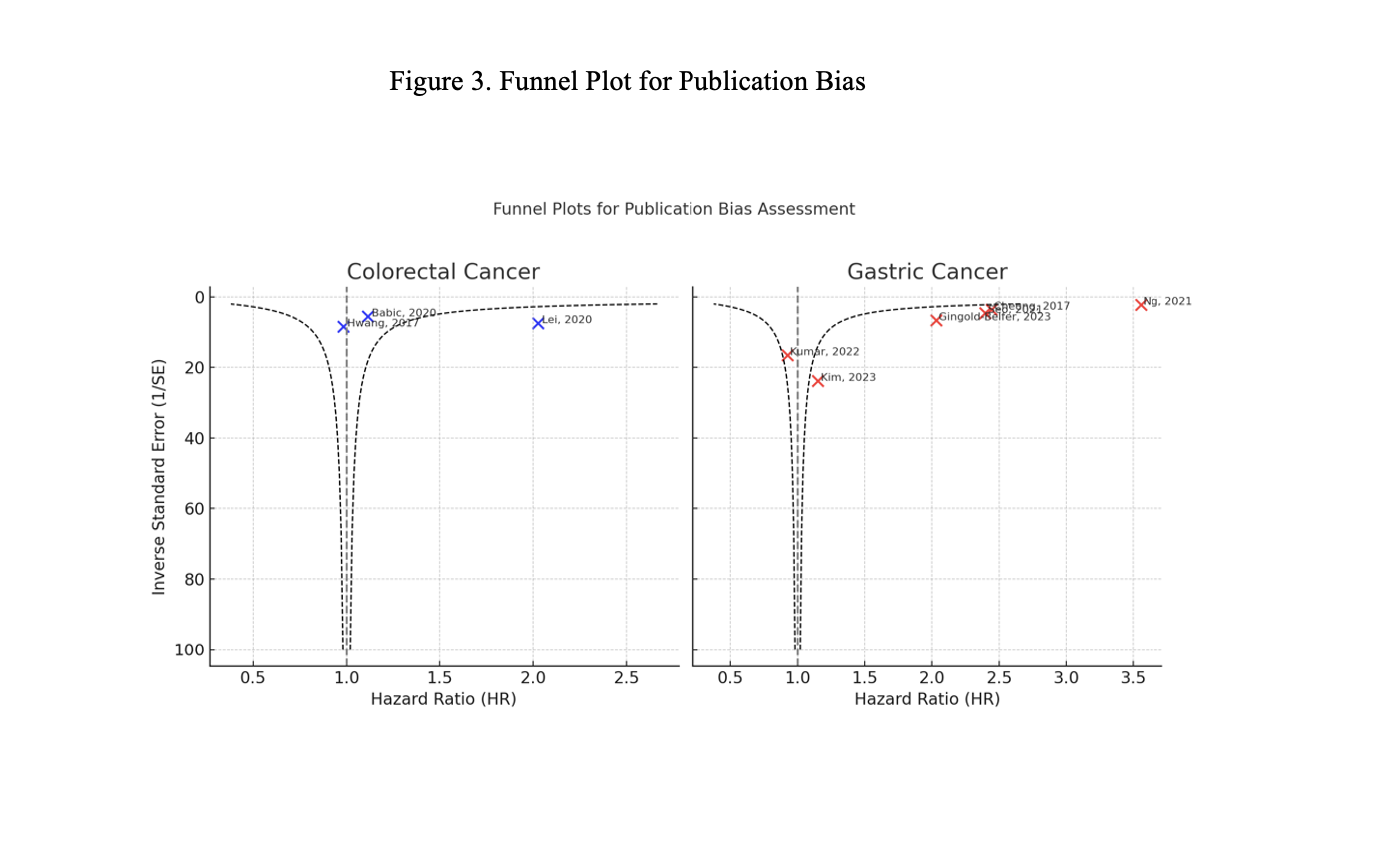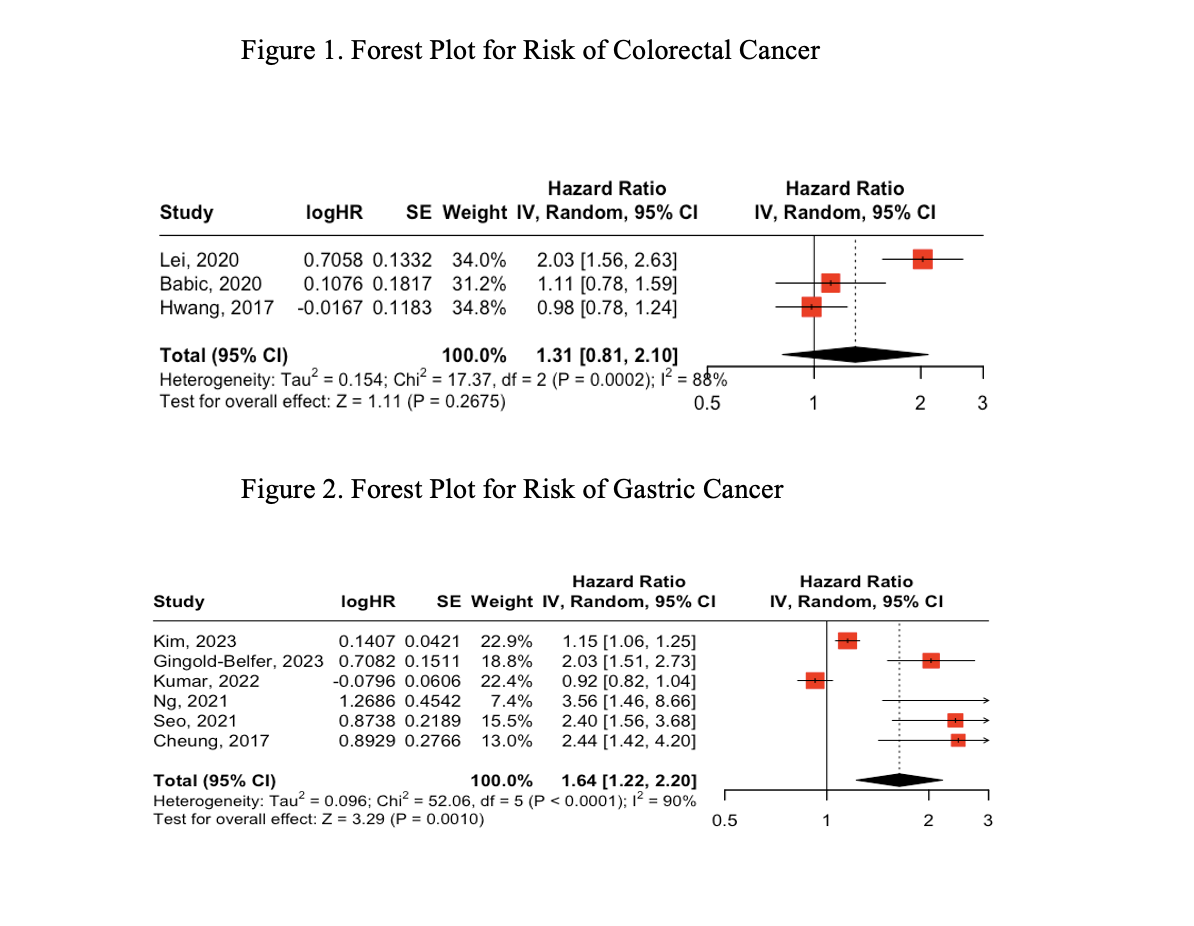Sunday Poster Session
Category: Stomach and Spleen
P2028 - Risk of Colon and Gastric Cancer Development After Long-Term Proton Pump Inhibitor Use: A Meta-Analysis
Sunday, October 26, 2025
3:30 PM - 7:00 PM PDT
Location: Exhibit Hall
- RU
Rafat Uddin, MS
SUNY Downstate Health Sciences University
Brooklyn, NY
Presenting Author(s)
Anwar Uddin, MD, Rafat Uddin, MS, Madia Ahad, MD, Peter Lymberopoulos, MD, Savanna Thor, DO, MPH
SUNY Downstate Health Sciences University, Brooklyn, NY
Introduction: Proton pump inhibitors (PPIs) are commonly prescribed for GERD, peptic ulcers, and other acid-related conditions. Though considered safe short-term, concerns exist about a possible link between long-term use and GI cancers, particularly colon and gastric. This meta-analysis examines whether extended PPI use is associated with an increased risk of colon or gastric cancer, focusing on cohort studies with ≥5 years of follow-up.
Methods: A systematic PubMed search identified cohort studies reporting HRs for colorectal or gastric cancer in patients on PPIs for ≥5 years. Pooled HRs were calculated using a random-effects model with inverse variance weighting. Heterogeneity was assessed via I². Tau² was estimated with the DerSimonian-Laird method; its confidence intervals were calculated using the Jackson approach.
Results:
Discussion: This meta-analysis found that long-term use of PPIs was associated with an increased risk of gastric cancer, based on pooled observational data (HR = 1.64; 95% CI: 1.22–2.20). The reason for this association is unclear and could be due to the use of PPI in patients with conditions such as H pylori or peptic ulcer disease which may increase their risks of gastric cancer. No significant association was seen with colorectal cancer (HR = 1.31; 95% CI: 0.81–2.10). Variation across studies likely stemmed from differing definitions of exposure and outcome. Still, most gastric cancer studies showed a consistent direction of risk. Funnel plots suggested possible publication bias in the gastric cancer data. These findings underscore the need for larger, better-designed studies to clarify the long-term safety of chronic PPI use and its link to GI cancer.

Figure: Figure 1 and 2: Forest Plot

Figure: Figure 3: Funnel Plot for Publication Bias
Disclosures:
Anwar Uddin indicated no relevant financial relationships.
Rafat Uddin indicated no relevant financial relationships.
Madia Ahad indicated no relevant financial relationships.
Peter Lymberopoulos indicated no relevant financial relationships.
Savanna Thor indicated no relevant financial relationships.
Anwar Uddin, MD, Rafat Uddin, MS, Madia Ahad, MD, Peter Lymberopoulos, MD, Savanna Thor, DO, MPH. P2028 - Risk of Colon and Gastric Cancer Development After Long-Term Proton Pump Inhibitor Use: A Meta-Analysis, ACG 2025 Annual Scientific Meeting Abstracts. Phoenix, AZ: American College of Gastroenterology.
SUNY Downstate Health Sciences University, Brooklyn, NY
Introduction: Proton pump inhibitors (PPIs) are commonly prescribed for GERD, peptic ulcers, and other acid-related conditions. Though considered safe short-term, concerns exist about a possible link between long-term use and GI cancers, particularly colon and gastric. This meta-analysis examines whether extended PPI use is associated with an increased risk of colon or gastric cancer, focusing on cohort studies with ≥5 years of follow-up.
Methods: A systematic PubMed search identified cohort studies reporting HRs for colorectal or gastric cancer in patients on PPIs for ≥5 years. Pooled HRs were calculated using a random-effects model with inverse variance weighting. Heterogeneity was assessed via I². Tau² was estimated with the DerSimonian-Laird method; its confidence intervals were calculated using the Jackson approach.
Results:
Discussion: This meta-analysis found that long-term use of PPIs was associated with an increased risk of gastric cancer, based on pooled observational data (HR = 1.64; 95% CI: 1.22–2.20). The reason for this association is unclear and could be due to the use of PPI in patients with conditions such as H pylori or peptic ulcer disease which may increase their risks of gastric cancer. No significant association was seen with colorectal cancer (HR = 1.31; 95% CI: 0.81–2.10). Variation across studies likely stemmed from differing definitions of exposure and outcome. Still, most gastric cancer studies showed a consistent direction of risk. Funnel plots suggested possible publication bias in the gastric cancer data. These findings underscore the need for larger, better-designed studies to clarify the long-term safety of chronic PPI use and its link to GI cancer.

Figure: Figure 1 and 2: Forest Plot

Figure: Figure 3: Funnel Plot for Publication Bias
Disclosures:
Anwar Uddin indicated no relevant financial relationships.
Rafat Uddin indicated no relevant financial relationships.
Madia Ahad indicated no relevant financial relationships.
Peter Lymberopoulos indicated no relevant financial relationships.
Savanna Thor indicated no relevant financial relationships.
Anwar Uddin, MD, Rafat Uddin, MS, Madia Ahad, MD, Peter Lymberopoulos, MD, Savanna Thor, DO, MPH. P2028 - Risk of Colon and Gastric Cancer Development After Long-Term Proton Pump Inhibitor Use: A Meta-Analysis, ACG 2025 Annual Scientific Meeting Abstracts. Phoenix, AZ: American College of Gastroenterology.
